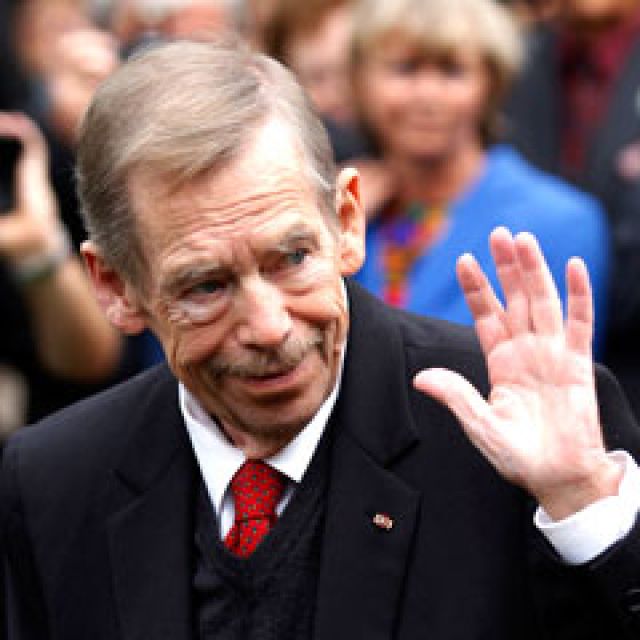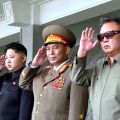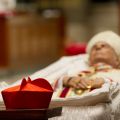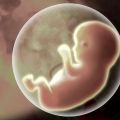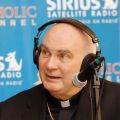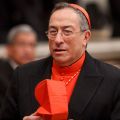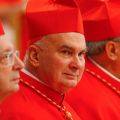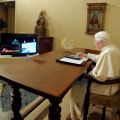News/International
Archbishop Dominik Duka of Prague, who was imprisoned with Havel by the communists, asked that the bells of all Catholic churches in the Czech Republic ring at 6 p.m. Dec. 18 in memory of the former president who died that morning at the age of 75.
The archbishop, who met Havel in prison in 1981 and continued to meet with him after the end of communism in 1989, was scheduled to celebrate Havel's funeral Mass Dec. 23 in St. Vitus Cathedral.
"He knew the loss of freedom, the denial of human dignity, oppression and imprisonment," Duka said in a statement posted Dec. 18 on the Czech bishops' web site. "I am convinced that everyone across the country, regardless of political or religious beliefs, owes him honour and thanks."
Havel, a playwright and essayist, was one of the founders of the Charter 77 movement, which began criticizing the communist government of then-Czechoslovakia, particularly for its lack of respect for human rights, in 1977.
He served four years of hard labour and nine months in prison for dissident activities before becoming head of state after the 1989 "Velvet Revolution" that toppled communism. He resigned in 1992 when Slovakia declared its independence, but was elected president of the Czech Republic six months later.
Havel met Pope Benedict XVI during the Pope's trip to Prague in 2009. He met Blessed John Paul II at least five times, three of them in Prague, and Havel attended the late pope's funeral at the Vatican in 2005. The two men admired one another and saw each other as participants in the same battle for freedom, human rights, human dignity and respect for the cultures of Eastern Europe.
In an interview with a Polish Catholic news agency in 2000, Havel said, "John Paul II is someone very close to me, who continually startles me with his personality and inspires me.
"His language, constantly stressing human dignity and recalling the rights of man, has been a novelty in the papacy's history. If the pope had been someone else, from another part of the world, without the historical experience of Poland, he probably wouldn't have had such a clear attitude to totalitarianism. John Paul II's services in this area are undeniable," he said.
He also told the interviewer that in April 1990 he made his confession to Pope John Paul during the pope's first Czech pilgrimage while under the spell of the pope's "charismatic personality."
"I suddenly realized I was in fact confessing in front of him, even though I'm not accustomed to going to confession, since I'm not a practising Catholic. I felt the need because of the great will to understand the other person that emanates from the person of the pope," Havel said.
L'Osservatore Romano, the Vatican newspaper, noted that Havel attended a Mass of thanksgiving in St. Vitus Cathedral immediately after his inauguration in 1989, restoring a practice Czech leaders had followed for centuries until the communists came to power.
"That ceremony was not only the recovery of an ancient liturgy that united politics and tradition, culture and religion, but represented the beginning of a new history, a history of freedom of which Vaclav Havel was the most important symbol," the newspaper said.
Bishops hope North Korea's regime change will bring peace, unification
By Carol Glatz Catholic RegisterBishop Peter Kang U-il of Cheju, president of the Catholic Bishops' Conference of Korea, said the leader's death Dec. 17 "may be the beginning of a turning point for the path of the reunification of the Koreas."
"We hope that the Lord gives the light and strength to the North Korean brothers so that there is a return for a policy focused on dialogue, peace and reconciliation," he said in an interview Dec. 19 with Fides, the Vatican's missionary news agency.
Bishop Lazzaro You Heung-sik of Daejeon, South Korea, told the Rome-based AsiaNews Dec. 19 that "we must focus on dialogue for peace but remain alert."
He said he feared the leader's death would prompt "a period of great confusion."
"Inside the regime, there will (be) a clash between the party and the army. The young age of the heir will not help a smooth transition," said You.
Kim's youngest son, 27-year-old Kim Jong-un, was declared the country's next leader.
Kim, who suffered a stroke in 2008, had ruled the reclusive communist state since 1994, following the death of his father, Kim Il-sung.
You said the new leader lacks the political experience needed to guide the country's relations with the United States, South Korea and China. He expressed concerns that the transition would not be smooth and that "a harsh conflict will break out now between the party, which is in the hands of the heir's uncle, and the military that are answerable to Kim Jong-un."
Too much political wrangling would mean the citizens of North Korea end up paying the price with continued poverty and deaths from hunger, he said.
"We must do our utmost to start sending humanitarian aid again and prevent more deaths from the situation. It is too soon to say what will happen on the Korean Peninsula, but we must pray and work so that peace wins," said You.
"We need to focus on dialogue now that a certain window of opportunity has opened up. We must pray for peace in Korea and the world, and use the Christmas season to remain vigilant but with a hand extended to our brothers in the North."
Fr. Baptist John Kim Hun-il, executive secretary of the Korean bishops' Subcommittee for Aid to North Korea, expressed hope that Kim's death would not plunge North Korea into further chaos, the Asian Church news agency UCA News reported. He also said that the bishops want to continue the committee's aid program to the North and that there might be the possibility of more openness within the secretive state that could lead to progress in reconciliation efforts.
After Korea was freed from Japanese rule at the end of the Second World War, it was split into the Soviet Union-backed communist North and the U.S.-supported South.
There have been no permanent resident priests or religious in North Korea since the Korean War started in 1950. In 1988, the government created the North Korea Catholic Association and built a Catholic church the following year. Occasionally, when Catholic clergy are allowed to visit the North, they are permitted to celebrate Mass in the church, but no one knows how many Catholics remain in the North.
The North is deeply impoverished and although churches are tightly controlled, Caritas Internationalis — the Vatican-based confederation of national Catholic charities — has been working in the North for more than 15 years. The help began when a series of floods in 1996 led to severe famine that lasted for years.
Church agencies rush aid to thousands of Philippine flood victims
By Catholic News ServiceCAGAYAN DE ORO, Philippines - Church agencies teamed with international aid groups and the Philippine government to assist tens of thousands of people left homeless in northern Mindanao by flash flooding caused by an intense tropical storm that left at least 650 people dead and hundreds more missing.
The country's National Disaster Risk Reduction and Management Council reported that about 135,000 people in 13 provinces were affected by Tropical Storm Washi, which unleashed floods and landslides as people slept in their homes across northern Mindanao late Dec. 16.
Casualty figures from the Philippine Red Cross Dec. 19 put the death toll at 652. But with another 808 people missing, that toll is expected to rise, reported the Asian church news agency UCA News.
Church sources in Cagayan de Oro and Iligan, two of the worst hit areas, say exact casualty figures are difficult to pin down because of the extensive damage caused by the storm.
Joe Curry, country representative for Catholic Relief Services, the U.S. bishops' overseas relief and development agency, told Catholic News Service Dec. 19 from Cagayan de Oro, a city of about 600,000, that about 35,000 people who lost their homes are being housed in evacuation centers in schools and outdoor covered gymnasiums
Overall, an estimated 75,000 of the city's residents living near a river that flows down from nearby mountains on its way to the ocean were affected by the flooding, he said.
"It looks kind of like the tsunami hitting," he said describing what he saw when he arrived in the low-lying area at the base of a mountain. "Everything was taken off the foundations. The water was 11 feet above its banks, and anything near it was wiped away."
Curry described survivors as stunned.
"People in the evacuation centers we've met have nothing left from their houses," he said. "Everything went with the house. They have no clothes. They have no kitchen items. They have nothing."
CRS, which sent a team of eight workers form Davao City, and other aid agencies met at the residence of Archbishop Antonio Ledesma of Cagayan de Oro, just outside the flood zone Dec. 19 to coordinate their response with the government. The representatives planned to meet every two days to report on their work and update their plan.
Curry said about 80 percent of the city is without water because water washed away the main water line through the city.
Beryl Tranco of the Panday Bulig Relief and Rehabilitation Center told UCA News that providing water to the city is the biggest challenge facing relief workers.
"Our priority was to distribute drinking water because there is no water, no electricity, the area smells of garbage and decaying bodies," she said.
Caritas Manila, church-run Radio Veritas and the Catholic Bishops' Conference of the Philippines' national social action secretariat have appealed for relief supplies, clothing and money from dioceses across the country.
In Manila, Archbishop Luis Antonio Tagle directed parishes to take up collection at Masses through Christmas for survivors.
Meanwhile, words of comfort and offers of assistance poured in from around the world.
After reciting the Angelus Dec. 18 at the Vatican, Pope Benedict XVI said he wanted to assure the people of the Philippines of his prayers. After the "violent tropical storm," he said, "I pray for the victims -- many of whom are children -- for the homeless and the numerous people who are missing."
Caritas Australia also announced the opening of an appeal for flood victims.
U.S. President Barack Obama offered condolences to the country and said the United States was prepared to assist in recovery efforts if needed.
Catholics at Cardinal Foley's funeral consoled for 'death in family'
By Catholic News ServicePHILADELPHIA - Philadelphia Catholics who filled the Cathedral Basilica of SS. Peter and Paul Dec. 16 for the funeral Mass of Cardinal John P. Foley were consoled for the "death in the family" and urged to emulate the prelate known for his sense of humor, intellect and strong faith.
In his homily, New York Archbishop Timothy M. Dolan, president of the U.S. bishops' conference, praised the late cardinal for his wit, gentle spirit and love for Jesus and the Catholic Church, which he said was "indeed the passion of John Patrick Foley's life."
He urged Philadelphia Catholics to always remember that Cardinal Foley "considered you his family" and he never stopped talking and bragging about the archdiocese "as much as many of us begged him to," the archbishop quipped.
Catholics skeptical of British review saying no mental health-abortion link
By Simon Caldwell, Catholic News ServiceMANCHESTER, England - Catholic medical professionals have questioned the reliability of a British review concluding that women who have abortions have no increased risk of developing mental health problems.
The British government-funded "Systematic Review of Induced Abortion and Women's Mental Health" found that although an unwanted pregnancy may cause mental health problems, it made no difference to the mother's mental well-being if she continued with the pregnancy or had an abortion.
The review was carried out by the National Collaborating Centre for Mental Health at the Royal College of Psychiatry and published by the Academy of Medical Royal Colleges.
Dr. Roch Cantwell, a consultant perinatal psychiatrist who led the review, said that the work showed "that abortion is not associated with an increase in mental health problems."
Cardinal Foley great friend to press
By Catholic News ServicePHILADELPHIA - U.S. Cardinal John P. Foley, longtime Catholic journalist and advocate of Catholic communication, was being fondly remembered after his Dec. 11 death as a friend to the Catholic press around the world.
The cardinal, a Philadelphia native, was residing at Villa St. Joseph in Darby, the home for retired Philadelphia archdiocesan priests, when he died of leukemia at age 76.
“I was pleased that he was able to come home during the final months of his life. No matter where he lived or how he served the Church over the years, he always considered Philadelphia his home,” said Philadelphia Archbishop Charles J. Chaput.
Climate change is a faith issue, Honduran cardinal says
By Cindy Wooden, Catholic News ServiceVATICAN CITY - Climate change is a faith issue because it deals with God's creation and with poverty, said Honduran Cardinal Oscar Rodriguez Maradiaga of Tegucigalpa.
The cardinal, president of Caritas Internationalis, was in Durban, South Africa, for the U.N.-sponsored international conference on climate change Nov. 28-Dec. 9; he discussed the conference Dec. 13 with journalists at the Vatican.
Caritas Internationalis, a confederation of 165 national Catholic charities, provides emergency relief and development aid around the globe. But it also teaches Catholics about the church's social doctrines, advocating and educating people about issues of justice and peace, he said.
Cardinal Foley dies; was Vatican communications chief, Mideast advocate
By Catholic News ServiceDARBY, Pa. U.S. Cardinal John P. Foley, who spent more than two decades leading the Church's social communications council and later worked for the Church in the Middle East, died Dec. 11 after a battle with leukemia.
The cardinal, who had been residing at Villa St. Joseph, the home for retired Philadelphia archdiocesan priests, was 76. Cardinal Foley's media-friendly style and quick sense of humour shone in person and throughout the numerous speeches and homilies he delivered around the world. He often spoke of the joys of working for the Church, telling his audiences that while the pay often is not great "the benefits are out of this world."
Cuban bishops declare Marian jubilee year, confirm papal visit
By Catholic News ServiceHAVANA - The Cuban bishops announced that 2012 would be a Marian jubilee year and that Pope Benedict XVI would come to Cuba as a "pilgrim of La Caridad," the popular name for the Virgin of Charity of El Cobre, the country's patroness.
In a Dec. 8 pastoral letter, they declared a jubilee year from Jan. 7, 2012, through Jan. 6, 2013, and said Cubans need the joy of faith, the strength of Christian love and the light of hope that can come from "a reunion with our Christian roots" and with the "enthusiastic reception of the teachings of Jesus Christ."
Girls under 17 must consult doctors to get 'morning-after pill'
By Nancy Frazier O’Brien, Catholic News ServiceWASHINGTON - The U.S. bishops' pro-life spokeswoman said she was relieved that the Obama administration has decided not to allow the Plan B One-Step "morning-after pill" to be sold without a prescription to those under 17.
"Luckily, things did not go from bad to even worse," Deirdre McQuade, assistant director for policy and communications at the USCCB Secretariat of Pro-Life Activities, told Catholic News Service Dec. 8. "We're pleased that they did not expand access to this very powerful drug."
McQuade said Plan B One-Step, known generically as levonorgestrel, "is 40 times more potent than comparable progestin-only birth control pills for which a prescription is required" even for adult women.
Pope taps tablet, lights world's largest Christmas 'tree'
By Kristin Gobberg, Catholic News ServiceVATICAN CITY - Pope Benedict XVI tapped a tablet computer and successfully lit the world's largest electronic Christmas "tree" located in the Italian town of Gubbio.
Before turning on the tree with a tap on the Sony S Tablet, the pope addressed the citizens of Gubbio via a video link from his apartment in Vatican City Dec. 7, calling on Christians to serve as a light in the lives of others.
In his talk, the pope said that just as the tree design in Gubbio was made up of tiny individual lights, each person needs to bring light to the people and places in their lives, to their family, workplace, neighborhood, town or city.

